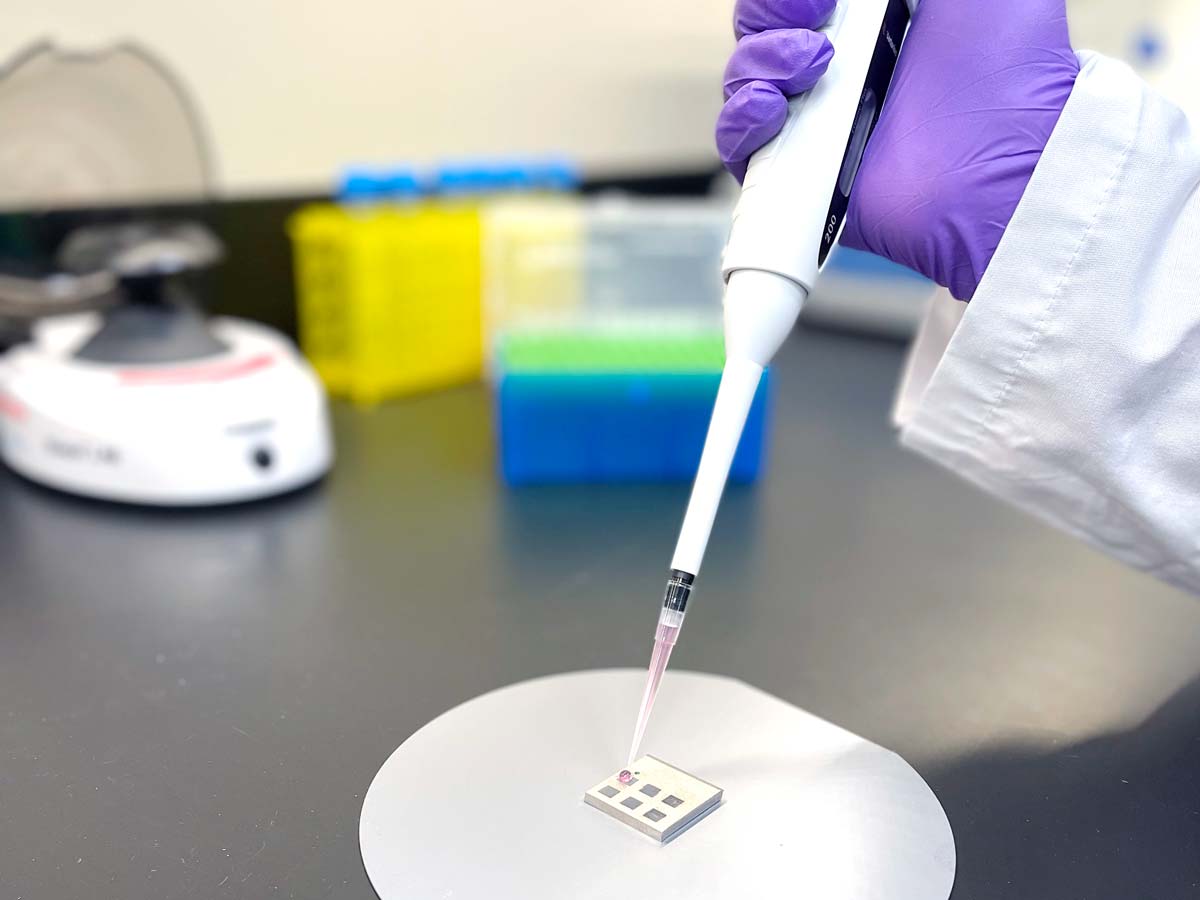How to program a better tomorrow: Harnessing disruptive technologies
Innovation Issue 38: Summer 2023
Tiny sensors have a big impact on cancer detection
Idea to Innovation
Tiny sensors have a big impact on cancer detection

Professor Bo Tan leads a team that has developed a cancer detection process that uses quantum sensors to analyze blood samples. Photo courtesy of Bo Tan.
A new leading-edge cancer detection process has been developed by a team from Toronto Metropolitan University (TMU) and Unity Health Toronto, using their patented quantum sensors and machine learning technology.
The process uses quantum sensors, which are just a few nanometres in size, and optical microscopes to test small blood samples of only five microlitres for cancer biomarkers.
With the help of artificial intelligence, the light pattern seen in the microscope can be used to identify the type of cancer, if present, in the sample. The researchers’ findings show their sensors can detect several types of cancer cells and their original location with a high level of accuracy.
TMU Aerospace engineering professor Bo Tan, who leads the research team, explains that the level of accuracy varies depending on the type of cancer, but in their most recent experiments with these quantum sensors, they achieved nearly 100 per cent accuracy for detection with 10 types of early-stage cancer. Compared to other blood tests for cancer commonly used today, the researchers’ method can find biomarkers indicating early-stage tumours and hard-to-detect types of cancer, such as brain cancer, in a sample with fewer cancerous cells present.
“The sensors have a very wide range of applications, but we think cancer detection makes the most impact. That’s why we’re going after cancer diagnosis,” said professor Tan, who is a member of the Institute for Biomedical Engineering, Science and Technology (iBEST), a partnership between TMU and St Michael’s Hospital, Unity Health Toronto. Other potential applications of quantum sensor technology include drug detection in airports and precise measurements by pharmaceutical companies.
Professor Tan notes that cancer is often detected in its later stages. This research aims to find it earlier, potentially improving patient prognosis. The team has tested the sensors successfully with nine cancers, including breast, lung, uterine, renal, brain and ovarian, and they plan to expand testing to additional types of cancers. According to professor Tan, clinical tests are some of the next steps in bringing this innovation to market.
Creating quantum sensors
The team’s quantum sensors are fabricated using silicon particles that have been reduced to quantum size using ultrafast lasers. Professor Tan says the sensor sizes currently range from two to just under five nanometres, but the team aims to make them even smaller. The silicon material creates a “quantum effect,” giving off electrical signals visible to a specialized microscope. The way the light bounces off the blood sample allows the researchers to see the cancer biomarkers and use machine learning to determine the type of cancer by rapidly comparing the image data to a database. Professor Tan explains how this optical signal is significantly amplified by quantum sensors compared to using other sensor materials such as nanoparticles.
This quantum sensor technology has been patented under the Patent Cooperation Treaty, and the team has applied for a patent for the cancer detection application process. Professor Tan’s collaborators include fellow TMU professor Krishnan Venkatakrishnan, neurosurgeon Dr. Sunit Das and medical director of oncology and endoscopy Dr. Yoo-Joung Ko, both from St. Michael’s Hospital, Unity Health Toronto. The team members have all published widely on these topics.
The sensors have a very wide range of applications, but we think cancer detection makes the most impact. That’s why we’re going after cancer diagnosis.

Read more about the quantum probes and cancer detection methods developed by professor Tan and the team in two publications in Nature Communications, “Quantum scale organic semiconductors for SERS detection of DNA methylation and gene expression (external link, opens in new window) ” and “Minimally invasive detection of cancer using metabolic changes in tumor-associated natural killer cells with Oncoimmune probes (external link, opens in new window) .”
This research has been supported by the Natural Sciences and Engineering Research Council of Canada and TMU’s Faculty of Engineering and Architectural Science Dean’s Research Fund.